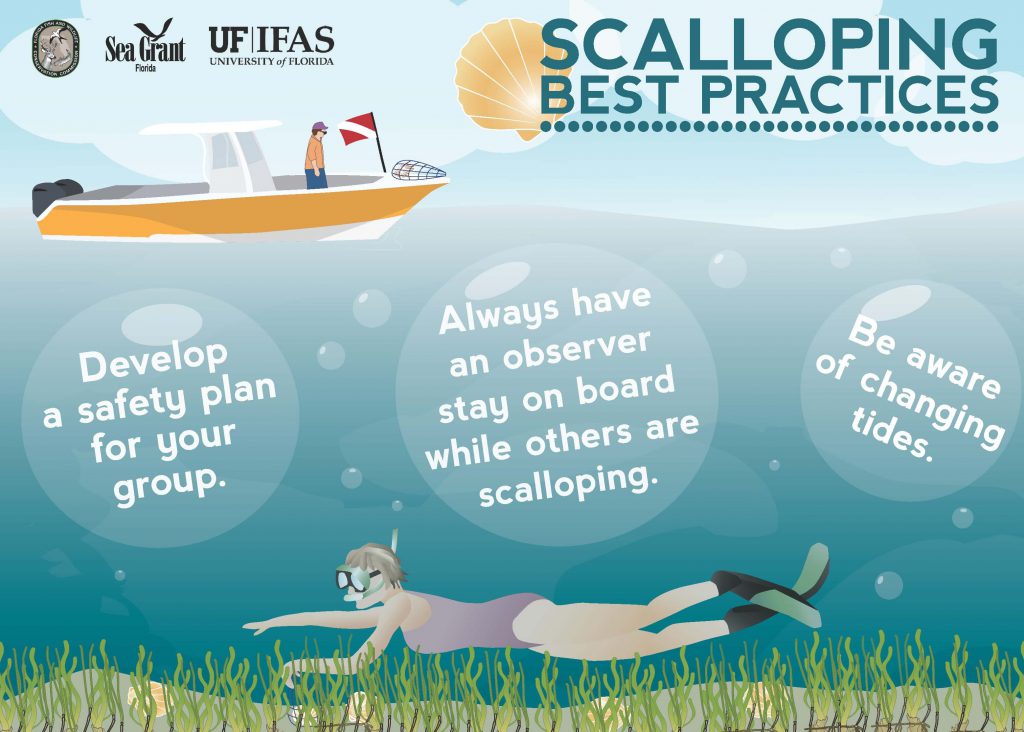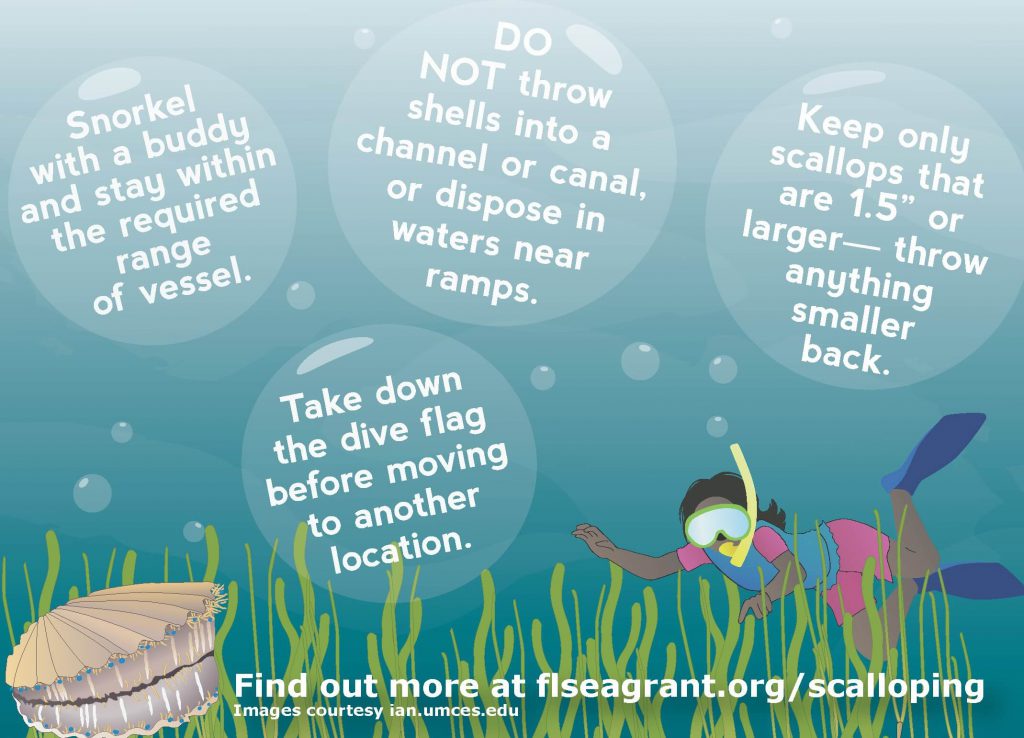Recreational bay scallop season is quickly approaching! Thousands of residents and visitors will flock to the shallow coastal areas of Florida’s Big Bend to go scalloping and seek out their limit of the sweet and tasty meat. Recreational boating in the Nature Coast reaches peak levels during scallop season, so expect congestion at boat ramps and plan to take extra precautions to keep safe from COVID-19 this scallop season.
Preparing For Scalloping
Whether you are trying out scalloping for the first time or a veteran scalloper with plenty of secret honey holes, a quick check of the following will help ensure you have a fun and safe scalloping experience.
Personal Equipment
You will need snorkel gear (mask, snorkel, fins, small mesh bag) or a dip net to harvest scallops. Also, be sure to toss in hand sanitizing gel or wipes, a face covering/mask, and plenty of water and sunscreen to keep healthy and safe.
License and Regulations
Anyone harvesting scallops needs a current Florida recreational saltwater fishing license, unless you are scalloping on a chartered trip. A saltwater fishing license can be obtained online from the FWC.
Make sure you understand the open seasons (see figure below) and the scallop harvesting regulations page for detailed information.
Daily Bag Limit: 2 gallons of whole bay scallops in shell or 1 pint of bay scallop meat per person; Maximum of 10 gallons of whole bay scallops in shell, or 1/2 gallon bay scallop meat per vessel. These rules apply in all zones and seasons except in the Taylor/Dixie zone (yellow shaded in figure below) where the bag limit is lowered to 1/2 of the per person and vessel limit from June 15 to 30.
Minimum Size Limit: None, though it is recommended that you toss back scallops smaller than 1.5 inches across (about the size of a golf ball).
Gear requirements: Scallops may only be landed by hand or by using a dip net, no other harvest methods are allowed.
Safety Equipment
Be sure to pack your divers down flag and familiarize yourself with the rules for displaying the flag. One of the most common divers down flag violations is displaying the flag while underway. Always remember to stow your flag before moving to a new location! Also, check your standard boating safety equipment to be sure you have enough life jackets for every person aboard, a throwable flotation device, a sound-producing device such as a whistle or air horn, and a supply of visual distress signals in good condition (not wet or expired).
Zone-Specific Open Seasons

As in previous years, the FWC decided to open certain zones along the Big Bend to scalloping at different times, including an open area in Pasco County. This makes the rules more complicated for scallopers, so be sure you understand the open and closed seasons and areas.
Transit through closed areas allowed
In past years, it was illegal to land or possess scallops outside open harvest areas. Starting in 2019, it is legal to directly transit through closed areas with legally harvested bay scallops on board. See the FWC’s Scalloping Regulations page for more, including details about GPS coordinates for harvest lines.
Scalloping Best Practices
 The earlier opening in Zone 2 (Dixie County line to Fenholloway River) means that the scallop meat may be quite small. Best practice would be to only harvest scallops that are at least 1.5 inches across. We suggest that you shuck a few scallops on the water before you collect your limit to see if the muscle meat is large enough to eat. If you feel the meat is too small to be worth your while, you can still have a great time scalloping and release the scallops alive to be caught another day! See this comprehensive resource for more scalloping best practices and take the Star Scalloper pledge today! The scallops will thank you!
The earlier opening in Zone 2 (Dixie County line to Fenholloway River) means that the scallop meat may be quite small. Best practice would be to only harvest scallops that are at least 1.5 inches across. We suggest that you shuck a few scallops on the water before you collect your limit to see if the muscle meat is large enough to eat. If you feel the meat is too small to be worth your while, you can still have a great time scalloping and release the scallops alive to be caught another day! See this comprehensive resource for more scalloping best practices and take the Star Scalloper pledge today! The scallops will thank you!

From scalloping brochures to the Big Bend Shellfish Trail map, many resources are available to orient visitors to the boating and recreational resources in local areas, including Wakulla, Jefferson, Taylor, Dixie, Levy, Citrus, Hernando, and Pasco Counties. Check them out and share widely!

Also, check out the upcoming Scalloping in a Pandemic Webinar series starting on June 12th at 6 PM (event page here – registration required). During this event, you will learn all you need to know about the 2020 scalloping season – rules and regs, scallop management information FWC, seagrass safe boating, and how to keep yourselves and your scallop catch safe. You can attend the event live online, or watch the recording later on the UF/IFAS Nature Coast Biological Station’s Facebook page.
Scallop Data and Management
FWC Bay Scallop Abundance Report

In a normal year, researchers with the Fish and Wildlife Research Institute (FWRI) would study bay scallop populations along the Gulf coast of Florida in pre-season surveys. This year, biologists were not able to collect pre-season data due to the coronavirus outbreak. The 2019 season was a very poor season compared to a typical year in all zones except Gulf County (Port St Joe area). Because 2020 numbers are not available, there is no way to predict if this season will be an improvement over 2019. The graph to the right shows scallop abundance data through 2019. Check back here for updates or see the FWC’s Scallop Abundance Report page for the most current information available.
St. Joseph Bay Restoration and Conservation Measures
Since 2016, the bay scallop season in St. Joseph Bay has been managed by a shortened season that opens later in the year. In 2020, the season will open later than other zones (August 16 – September 24, 2020) but the bag limit is the standard bag limit. Though 2019 was a record-setting year for the St. Joseph Bay area, historical FWRI research on scallop populations in this area shows scallop numbers are  very low. This is linked to red tide and other algal blooms, as well as hurricane and storms causing low salinity events. The FWC recently launched a new project to restore scallop populations in St. Joseph and St. Andrew Bays. Almost 200 volunteers in these areas are “babysitting” batches of 25 scallops in cages in hopes that spawning success will increase and re-seed the bay scallop populations in these two bays. See FWRI’s Bay Scallop Restoration page for more.
very low. This is linked to red tide and other algal blooms, as well as hurricane and storms causing low salinity events. The FWC recently launched a new project to restore scallop populations in St. Joseph and St. Andrew Bays. Almost 200 volunteers in these areas are “babysitting” batches of 25 scallops in cages in hopes that spawning success will increase and re-seed the bay scallop populations in these two bays. See FWRI’s Bay Scallop Restoration page for more.
Scallop Survey
FWRI researchers are asking for your help to gather data about recreational scallop harvest. Help FWC’s scallop researchers by completing an online survey at http://svy.mk/bayscallops. Harvesters can indicate where they harvest scallops, how many they collect and how long it takes to harvest them. You can email BayScallops@MyFWC.comto ask questions or send additional information.
Responsible Boating Reminders
Be Seagrass Safe
Be aware of seagrasses while boating in shallow areas! Many species, including bay scallops, depend on seagrasses and damage from propellers and boat anchors (called seagrass scarring)  reduces habitat quality and resilience of seagrasses over the long-term. Please visit the Be Seagrass Safe website for more information and take the pledge to be a seagrass safe boater!
reduces habitat quality and resilience of seagrasses over the long-term. Please visit the Be Seagrass Safe website for more information and take the pledge to be a seagrass safe boater!
Operation Dry Water
A national weekend (July 3 – July 5, 2020) of heightened enforcement of impaired boater laws. The aim is to increase awareness about the dangers of boating under the influence and reduce alcohol-related incidents. For more see http://www.operationdrywater.org/.
Links And Resources
Florida Sea Grant Scalloping: https://www.flseagrant.org/fisheries/scalloping/
FWRI Bay Scallops: https://myfwc.com/research/saltwater/mollusc/bay-scallops/
FWC Bay Scallop Fishing Regulations: https://myfwc.com/fishing/saltwater/recreational/bay-scallops/
UF/IFAS Florida Food Fare – Scallop Recipes: http://sarasota.ifas.ufl.edu/FCS/FlaFoodFare/Scallops.pdf
Operation Dry Water: https://myfwc.com/boating/safety-education/dry-water/
Be Seagrass Safe: http://bit.ly/seagrass_safe
Photos courtesy of UF/IFAS (Tyler Jones) and Florida Sea Grant
 0
0


